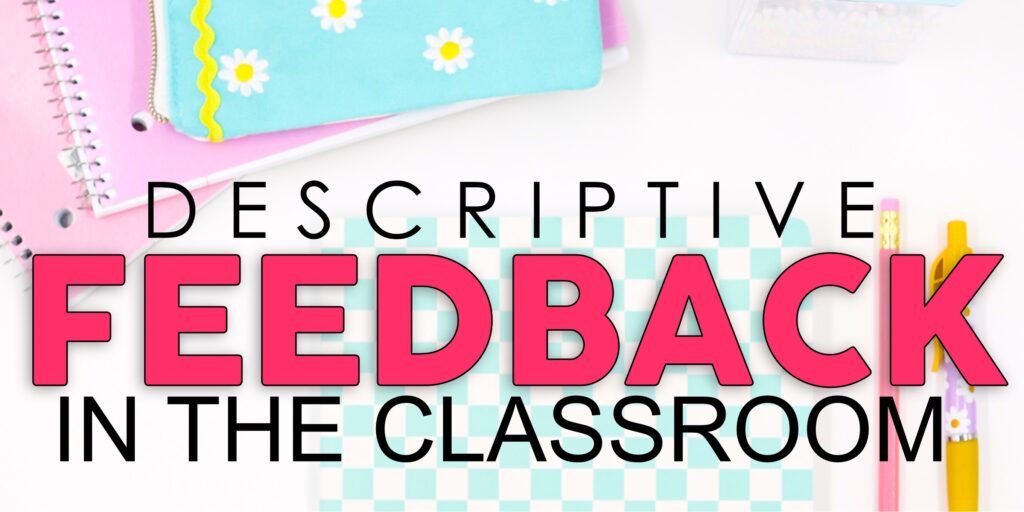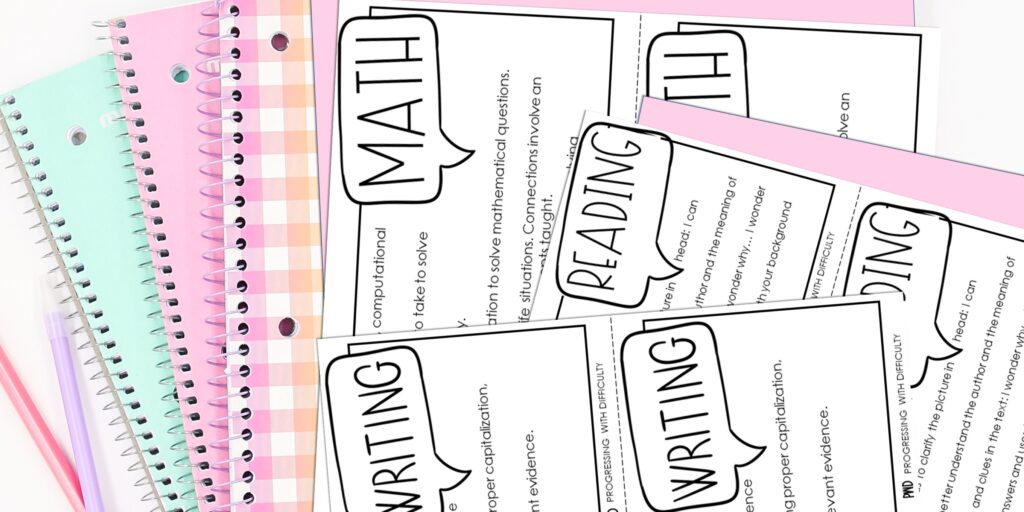
As teachers it is not just our job to present information and hope that students “get it.” We need and want our students to really understand and comprehend all the things that we are teaching them. This also includes more than just our curriculum! We are constantly teaching our students life skills and we want them to really be able to implement all we teach. One of the most effective ways to help make sure that our students are “getting it” whatever “it” is, is through descriptive feedback in the classroom.
Descriptive feedback can be a trigger word for some teachers. I know at times it has been for me! We often think, “I don’t have enough time!” “They should understand what their grade means.” Or we just forget, with the millions of things we do each day. Feedback is essential to helping students understand both what they got right, what they missed and how they can improve. It is THEN that they can do some really great learning. Luckily, I’ve got some great tips to help you provide great descriptive feedback in your classroom!
Be Mindful of the Language
I’m sure we all have a horror story of when we were given harsh feedback when we were students. Perhaps it’s even why we shy away from descriptive feedback. The language we use when we give feedback really matters. Students can be sensitive and we want to make sure that we don’t make students feel inadequate by the language we use. At the same time, it’s important not to sugarcoat feedback as it will be less helpful. Make sure you focus your language on the concepts and skills that are being developed and make it encouraging! For example: “You’re doing great in solving equations but need a little more practice in using pictures and words to explain your thinking and show how you arrived at your answer”.
“Yet” is a powerful word in my classroom. It lets students know they are capable even if they aren’t there right now. Just as important as it is for us to be mindful of our language with feedback, we should encourage our students to be mindful as well. We can encourage our students to be positive and optimistic. It is also really beneficial to have students notice what they need to work on. You can prompt students to notice what they have mastered and what they need to keep working on. Positive, constructive, and descriptive peer feedback can also be powerful for students.
Delay the Grade
Students can often get really caught up in their grades. While grades are a type of feedback, students don’t often use them as such. By holding off on grades, it can help students to better focus on the descriptive feedback that you give. One easy way to do this is to grade tests with the usual mark and feedback but don’t provide a grade on the assessment itself. This will allow students to focus on the feedback rather than getting caught up in the grade itself. You can also have students reflect on their tests and do corrections before giving them the grade. This allows students to think about their learning and fix mistakes which has been proven to provide more learning than just getting the answers correct in the first place! Of course you will want to give a grade eventually, but delaying grades can help to put a focus on student growth rather than simply student achievement.

Lower the Expectations
I am a firm believer that students rise to high expectations. In some instances though, lowering our expectations can help to reduce student anxiety and help students learn. I think the key here is not lowering the expectations of what students are able to learn, but trying to lower the expectations of results or grades. Students need chances to practice and explore new concepts without feeling like they will not succeed or that their grades will suffer. You can easily do this by creating assignments that are centered around the concept being taught. Don’t factor in things such as spelling, grammar or accuracy. I sometimes will even just grade on completion rather than correction and still give them feedback. This may not be an option for all teachers, but it allows you to encourage participation and learning while not letting their grades suffer on the assignments where they are still trying to grasp a concept. Doing this will give students the message that learning is not about perfection but rather gaining understanding. They are more likely to take risks when they don’t have to worry about losing marks.

Provide Retakes
This is not always a first choice of mine as sometimes I’m concerned about teaching personal responsibility and consequences. I want students to know that what they do in the classroom matters. I know it can bring up much debate however, I have seen many benefits to allowing retakes. When students have failed at understanding a concept or skill, another chance can be considered an important step toward actual learning. This is the whole purpose of providing grades and feedback, is eventually to help students truly understand what we are trying to teach them. I do try to emphasize we have retakes for the sake of learning as opposed to raising grades. This can be tricky, but I feel like it comes more easily as I apply the other suggestions about focusing on learning rather than grades throughout my classroom. Most importantly, helping students feel good about the ability to learn instead of their ability to achieve high grades, will help foster the growth mindset that will serve them much more throughout their lives. Grades can be important, but most important is learning and the more we teach that to our students, the more we are setting them up for success.
Ready, Set, Feedback!
Whether you are a master at giving your students feedback or maybe you need to add feedback into your classroom, I hope these tips have been helpful! Feedback is an essential part of our students’ learning and while we may feel like we don’t have time, we don’t have time NOT to give our students feedback. So take one or all of these ideas and see how you can better implement feedback into your classroom. I promise your students will thank you and you will watch their learning and understanding increase drastically!










